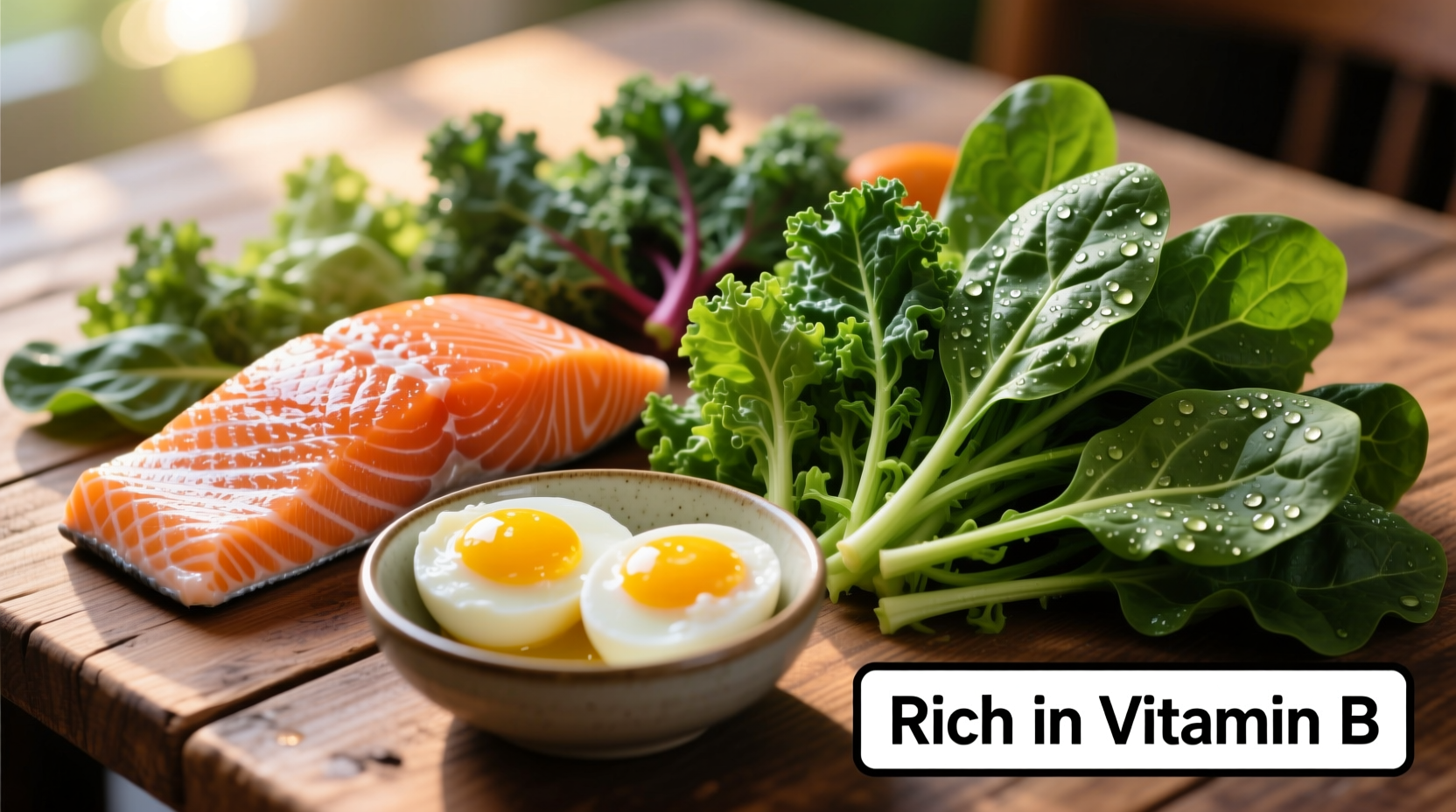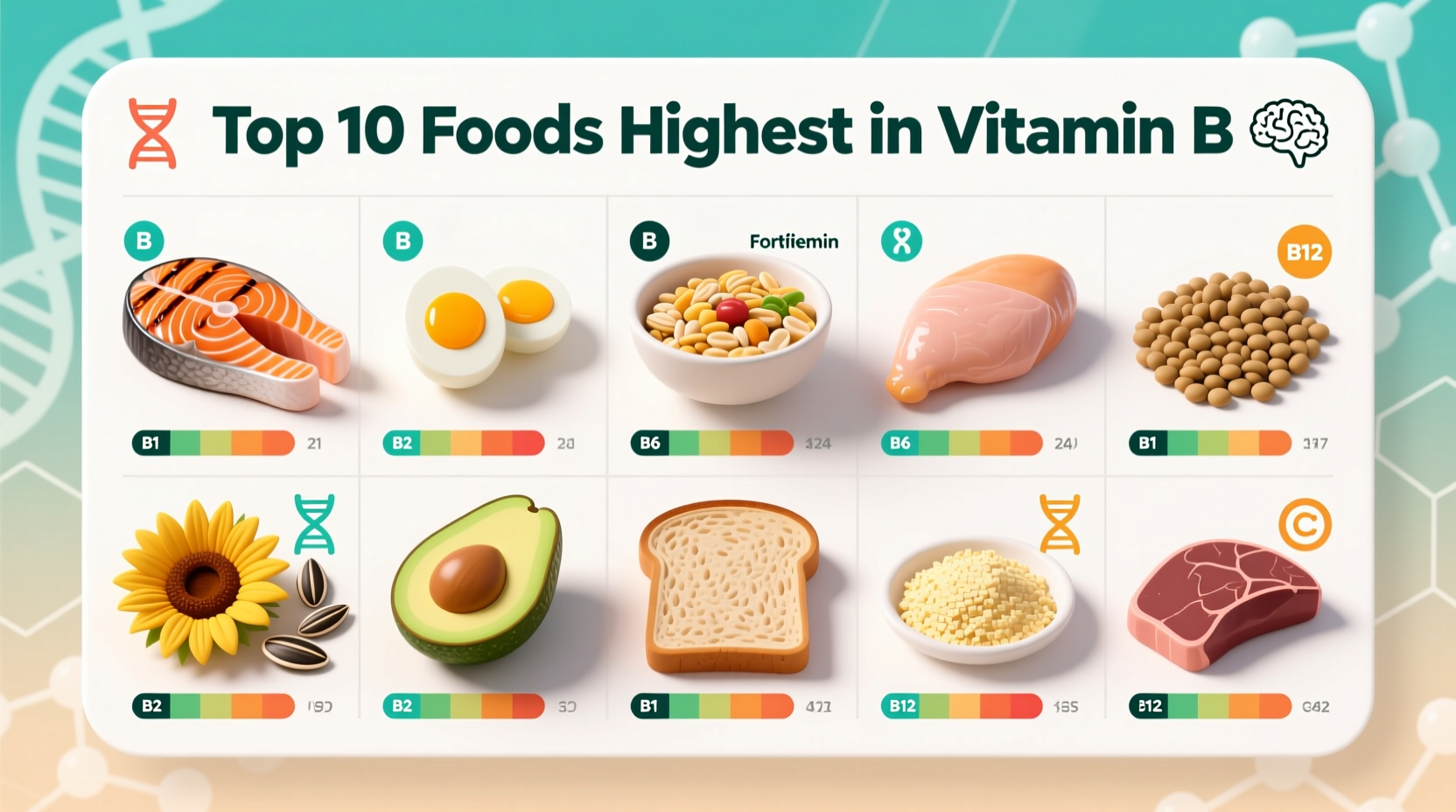When searching for foods highest in vitamin B, it's crucial to understand that vitamin B isn't a single nutrient but a complex of eight essential vitamins. Each plays unique roles in your body, from energy production to brain function and red blood cell formation. Consuming a variety of vitamin B-rich foods ensures you get all these critical nutrients naturally, without relying solely on supplements.
Why Vitamin B Matters for Your Health
Vitamin B complex supports over 100 enzymatic reactions in your body. Deficiencies can lead to fatigue, neurological issues, skin problems, and anemia. The National Institutes of Health notes that certain populations—like older adults, vegetarians, and those with digestive disorders—are at higher risk for specific B vitamin deficiencies, particularly B12.
| Vitamin B Type | Primary Functions | Top Food Sources | 100g Serving Provides |
|---|---|---|---|
| B1 (Thiamine) | Energy metabolism, nerve function | Nutritional yeast, sunflower seeds, pork | Up to 150% DV |
| B2 (Riboflavin) | Cell growth, energy production | Liver, eggs, almonds | Up to 200% DV |
| B3 (Niacin) | DNA repair, cholesterol management | Tuna, chicken, mushrooms | Up to 80% DV |
| B5 (Pantothenic Acid) | Hormone production, cholesterol synthesis | Mushrooms, avocados, sunflower seeds | Up to 100% DV |
| B6 (Pyridoxine) | Brain development, immune function | Chickpeas, salmon, potatoes | Up to 75% DV |
| B7 (Biotin) | Metabolism of fats and carbs | Egg yolks, liver, nuts | Up to 100% DV |
| B9 (Folate) | Cell division, DNA synthesis | Leafy greens, lentils, asparagus | Up to 100% DV |
| B12 (Cobalamin) | Nerve function, red blood cell formation | Liver, clams, fortified nutritional yeast | Over 1000% DV |
Nutritional Yeast: The Complete B Vitamin Powerhouse
Nutritional yeast stands out as one of the most complete plant-based sources of B vitamins. Just 15g (2 tablespoons) of fortified nutritional yeast provides 100% or more of your daily needs for B1, B2, B3, and B6. According to USDA FoodData Central, it's particularly valuable for vegetarians and vegans who may struggle to get adequate B12 from natural food sources.
The vitamin B content in nutritional yeast has evolved significantly since its introduction as a food product. Originally a byproduct of beer brewing, modern nutritional yeast is specifically cultivated and fortified to maximize its nutritional profile. This represents an important timeline in how we've learned to harness food processing to address common nutrient deficiencies.
Liver: Nature's Most Concentrated B Vitamin Source
Beef liver is arguably the most nutrient-dense food on the planet, particularly for B vitamins. A 3-ounce serving contains:
- Over 3,000% of your daily B12 needs
- Nearly 200% of folate (B9)
- More than 100% of riboflavin (B2)
- Significant amounts of B3, B5, and B6
While liver's strong flavor isn't for everyone, incorporating small amounts (2-3 ounces once or twice weekly) can dramatically improve your B vitamin status. For those concerned about vitamin A toxicity from frequent liver consumption, chicken liver offers similar B vitamin benefits with lower vitamin A content.
Seafood Solutions: Salmon and Shellfish for B Vitamins
Fatty fish like salmon provide excellent amounts of B3 (niacin), B6, and B12. A 6-ounce fillet delivers approximately:
- 100% of your daily B12 needs
- 75% of B6 requirements
- 50% of niacin (B3)
Clams represent an even more concentrated source—just 3 ounces provides a staggering 1,400% of your daily B12 requirement. This makes shellfish particularly valuable for preventing B12 deficiency, which the National Institute of Aging identifies as increasingly common in adults over 50 due to reduced stomach acid production.
Plant-Based Powerhouses for Vegetarians and Vegans
For those following plant-based diets, certain foods provide exceptional B vitamin content:
- Sunflower seeds: Excellent source of B5 (pantothenic acid) and B6
- Legumes: Chickpeas and lentils offer substantial B6 and folate
- Whole grains: Brown rice and oats provide B1, B3, and B6
- Leafy greens: Spinach and asparagus are folate (B9) champions
It's important to note context boundaries for plant-based B12 sources. While some algae and fermented foods contain B12 analogs, these often aren't bioavailable to humans. The Academy of Nutrition and Dietetics recommends fortified foods or supplements as reliable B12 sources for vegans.

Maximizing Vitamin B Absorption from Food
Simply consuming B vitamin-rich foods isn't enough—you need to optimize absorption. Consider these practical tips:
- Pair with healthy fats: B vitamins are water-soluble, but certain preparation methods with healthy fats can improve overall nutrient absorption
- Avoid excessive alcohol: Chronic alcohol consumption significantly impairs B vitamin absorption and increases excretion
- Don't overcook: Many B vitamins are heat-sensitive; gentle cooking preserves more nutrients
- Consider timing: Taking B vitamins with meals improves absorption and reduces potential stomach upset
When Food Isn't Enough: Understanding Supplementation Needs
While whole foods should be your primary source of B vitamins, certain situations warrant supplementation:
- Confirmed B12 deficiency (common in older adults and vegetarians)
- Megaloblastic anemia diagnosed by a healthcare provider
- Certain medical conditions like pernicious anemia or Crohn's disease
- Pregnancy (particularly for folate/B9)
The Centers for Disease Control and Prevention recommends that all women capable of becoming pregnant consume 400 micrograms of synthetic folic acid daily from supplements or fortified foods, in addition to food folate from a varied diet.
Practical Meal Planning with Vitamin B-Rich Foods
Incorporate these simple strategies to boost your daily B vitamin intake:
- Start your day with scrambled eggs (B2, B12) and spinach (folate)
- Add nutritional yeast to popcorn or pasta dishes for a cheesy flavor boost
- Include lentil soup or chickpea salad for lunch (excellent B6 and folate sources)
- Choose salmon or chicken for dinner with roasted sunflower seeds as a garnish
- Snack on almonds or sunflower seeds for B2 and B5
Remember that variety is key—no single food provides all B vitamins in optimal amounts. By rotating through different vitamin B-rich foods throughout the week, you'll ensure comprehensive coverage of all eight essential B vitamins.











 浙公网安备
33010002000092号
浙公网安备
33010002000092号 浙B2-20120091-4
浙B2-20120091-4